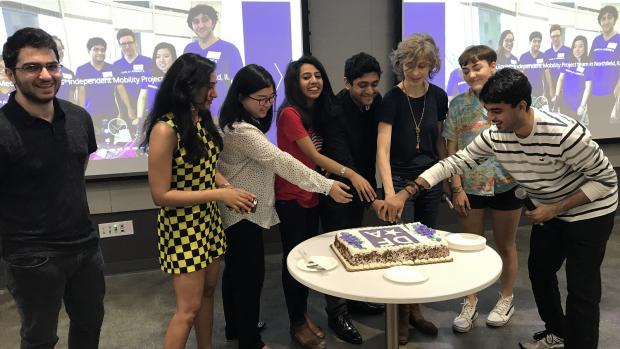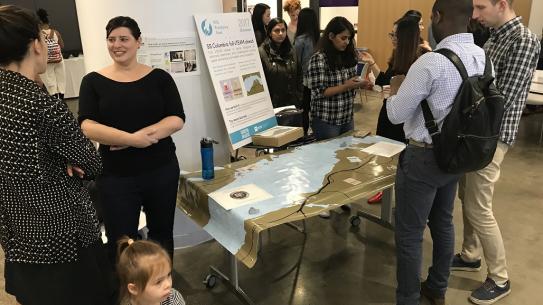Design for America (DFA) wins Cooper Hewitt Smithsonian Honors, including recognition of DFA NYU

Professor and DFA NYU adviser Anne-Laure Fayard celebrated with DFA NYU student leaders at the Spring 2017 Project Showcase.
The Cooper Hewitt Smithsonian National Design Awards were founded in 2000 to increase national awareness of good design and how it can enhance quality of life. This year, during National Design Week (scheduled to be held in mid-October), the honorees will include Design for America, an organization that equips students to tackle social challenges through design innovation, which won in the category of corporate and institutional achievement.
While DFA encompasses 37 chapters (known as “studios” in the group’s parlance) with more than 1,000 student members, Cooper Hewitt specifically cited the efforts of DFA NYU in the decision. “Here is how a studio makes tangible impact when all the pieces of the DFA puzzle converge,” the museum’s website explains. “DFA NYU is a network of students, mentors, local organizations, community members and alumni, and is greater than the sum of its parts. Despite having only been part of the network for three years, the studio contributes 101 members from 35 different majors. With help from mentors spanning the spectrum of design — researchers, teachers, innovators, physicians, artists, engineers, and urban planners — DFA NYU has worked on 20 projects addressing everything from STEM programming for kids, to safe and inclusive spaces for LGBTQ Muslims, to long-term financial sustainability for retiring Baby Boomers.”
DFA NYU members are advised by Tandon Professor of Technology Management and Innovation Anne-Laure Fayard, a staunch proponent of collaborative, human-centered design thinking — an iterative practice in which the end user’s needs are paramount and out-of-the-box ideas are encouraged. Under her tutelage, the group garnered the 2016 and 2017 NYU President’s Service Award, which recognizes students’ commitment to civic engagement and community, and State Senator Jesse Hamilton recognized the studio in 2017 for its work within Brooklyn and the greater New York City area.
Among the initiatives that have attracted attention for NYU’s studio is an ongoing partnership with the S.S. Columbia Project, an organization that is restoring the oldest excursion steamship left in the United States. A team of DFA NYU student members are working on developing interactive educational experiences at the intersection of science and art, including a board game and live challenges, for schoolchildren. Other DFA NYU ideas — including the Bindi Project, which aimed through community-centered design to provide women in low-income neighborhoods with the knowledge, skills, and support they need to become catalysts for change in their communities; mobility devices for the elderly; and financial services for baby boomers — have also sparked widespread interest and have contended successfully in multiple design and innovation challenges. Two recent DFA NYU projects focused on homelessness — a growing and urgent problem in New York City and beyond.

“As young and successful as DFA NYU is, they continue to challenge their city and themselves to better one another,” the Cooper Hewitt site explained.
Being part of such a large and dynamic organization greatly enhances the possibilities for Tandon’s aspiring engineers — and for anyone at NYU engaged in finding multidisciplinary solutions to problems of global importance. “We started a club using human-centered design for social innovation in 2011,” Fayard says. “Joining the DFA network in 2015 gave students access to extra resources, but most importantly a sense of belonging and community, and as an adviser, I get the benefit of a great network of mentors with whom to share experiences and ideas.
As we are faced with increasingly difficult societal problems, it’s important, and reassuring, to see passionate students joining forces to tackle those problems.”
— Professor Anne-Laure Fayard

